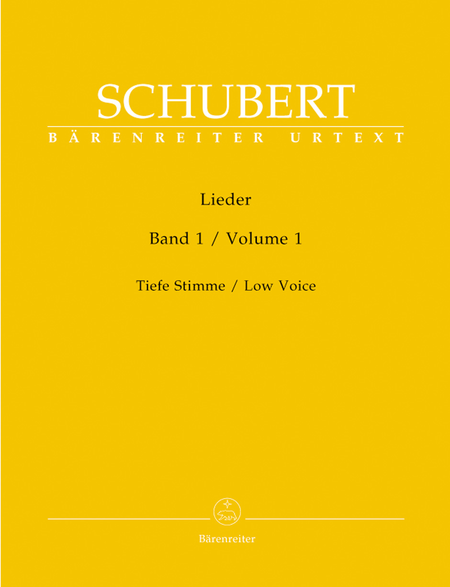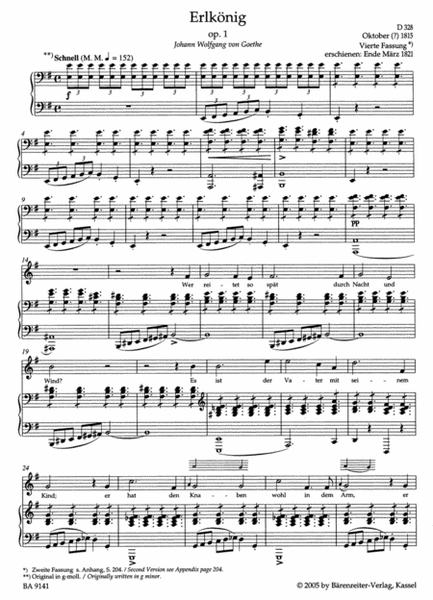Lieder, Volume 1 (Band 1)
low voice (including Die schone Mullerin op. 25 D 795)
-
Ships in 1 to 2 weeks
Details
Description
SKU: BA.BA09141
Low voice (including Die schone Mullerin op. 25 D 795). Composed by Franz Schubert. Edited by Walther Durr. This edition: urtext edition. Paperback. Barenreiter Urtext. Low voice. Singing Score, anthology. Op. 25, D 795. Baerenreiter Verlag #BA09141. Published by Baerenreiter Verlag (BA.BA09141).ISBN 9790006525713. 30 x 23 cm inches.
Schubert lieder for discerning musicians The start of a new Bärenreiter Urtext Edition The New Schubert Edition is the only scholarly-critical edition that will, once completed, include Franz Schubert's lieder in their entirety. In response to the rising expectations of performers and listeners alike, all the lieder will be published over the next few years in performing editions containing the text of Walther Dürr , the eminent Schubert scholar and former Managing Editor of the New Schubert Edition. The new series will substitute the edition jointly published by Bärenreiter and G. Henle since 1977.
Introduction by Walther Dürr focuses on peculiarities in the genesis and performance history of each lied and provides solid information on performance practice
- Adopts straightforward ordering principle from the New Schubert Edition: first by opus number, then in chronological order
- Complete transposition into three vocal registers finally allows every singer to work with the latest findings of Schubert scholarship
The edition is scheduled to include eleven volumes. Each volume will appear in three editions; one for high voice, one for middle voice and one for low voice.
“There are still too few singers who use the scholarly-critical edition of Schubert's lieder with the Urtext from the New Schubert Edition. However, the awareness to work with the musical text and its transmission is growing, even among solo vocalists. The edition has been produced, adhering where possible to the original musical text and without editorial emendations. This enables singers and accompanists to make their own interpretations of the lieder, while keeping as close to Schubert’s original intentions as possible. Not only are editorial decisions clearly identified – this is to be expected in the critical editions of today – but Schubert’s notational idiosyncrasies are fully retained, e. g the exact placement of dynamic marks and the often vague distinction between crescendo hairpins and accents. The edition gives suggestions for rendering appoggiaturas and grace-notes and includes alternative versions in the appendix. This makes it abundantly clear that introductions and other ornamental embellishments were fully in keeping with the musical practice of Schubert's time. We are delighted to learn that this high-quality edition will now be published.”
( Christoph Prgardien Andreas Staier )
The Editor
For more than two decades Professor Walther Dürr was the Managing Editor of the Neue Schubert- Ausgabe in Tübingen , to which he contributed the lieder volumes. He has taught at the universities of Stuttgart , Freiburg, Berne , and Tübingen and is considered one of the most distinguished Schubert scholars in the world.
About Barenreiter Urtext
What can I expect from a Barenreiter Urtext edition?
MUSICOLOGICALLY SOUND
- A reliable musical text based on all available sources
- A description of the sources
- Information on the genesis and history of the work
- Valuable notes on performance practice
- Includes an introduction with critical commentary explaining source discrepancies and editorial decisions
... AND PRACTICAL
- Page-turns, fold-out pages, and cues where you need them
- A well-presented layout and a user-friendly format
- Excellent print quality
- Superior paper and binding
Song List (48)
- Erlkoenig D 328, op. 1
- Gretchen am Spinnrad D 118, op. 2
- Schaefers Klagelied D 121, op. 3,1
- Meeres Stille D 216, op. 3,2
- Heidenroeslein D 257, op. 3,3
- Jaegers Abendlied D 368, op. 3,4
- Der Wanderer D 489, op. 4,1
- Morgenlied D 685, op. 4,2
- Wanderers Nachtlied D 224, op. 4,3
- Rastlose Liebe D 138, op. 5,1
- Naehe des Geliebten D 162, op. 5,2
- Der Fischer D 225, op. 5,3
- Erster Verlust D 226, op. 5,4
- Der Koenig in Thule D 367, op. 5,5
- Memnon D 541, op. 6,1
- Antigone und Oedip D 542, op. 6,2
- Am Grabe Anselmos D 504, op. 6,3
- Die abgebluehte Linde D 514, op. 7,1
- Der Flug der Zeit D 515, op. 7,2
- Der Tod und das Maedchen D 531, op. 7,3
- Der Juengling auf dem Huegel D 702, op. 8,1
- Sehnsucht D 516, op. 8,2
- Erlafsee D 586, op. 8,3
- Am Strome D 539, op. 8,4
- Gesaenge des Harfners aus Wilhelm Meister D 478, op. 12
- Der Schaefer und der Reiter D 517, op. 13,1
- Lob der Traenen D 711, op. 13,2
- Der Alpenjaeger D 524, op. 13,3l
- Suleika I D 720, op. 14,1
- Geheimes D 719, op. 14,2
- An Schwager Kronos D 369, op. 19,1
- An Mignon D 161, op. 19,2
- Ganymed D 544, op. 19,3
- Sei mir gegruesst D 741, op. 20,1
- Fruehlingsglaube D 686, op. 20,2
- Haenflings Liebeswerbung D 552, op. 20,3
- Auf der Donau D 553, op. 21,1
- Der Schiffer D 536, op. 21,2
- Wie Ulfru fischt D 525, op. 21,3
- Der Zwerg D 771, op. 22,1
- Wehmut D 772, op. 22,2
- Die Liebe hat gelogen D 751, op. 23,1
- Selige Welt D 743, op. 23,2
- Schwanengesang D 744, op. 23,3
- Schatzgraebers Begehr D 761, op. 23,4
- Gruppe aus dem Tartarus D 583, op.24,1
- Schlaflied D 527, op. 24,2
- Die schoene Muellerin D 795, op. 25


 Share
Share